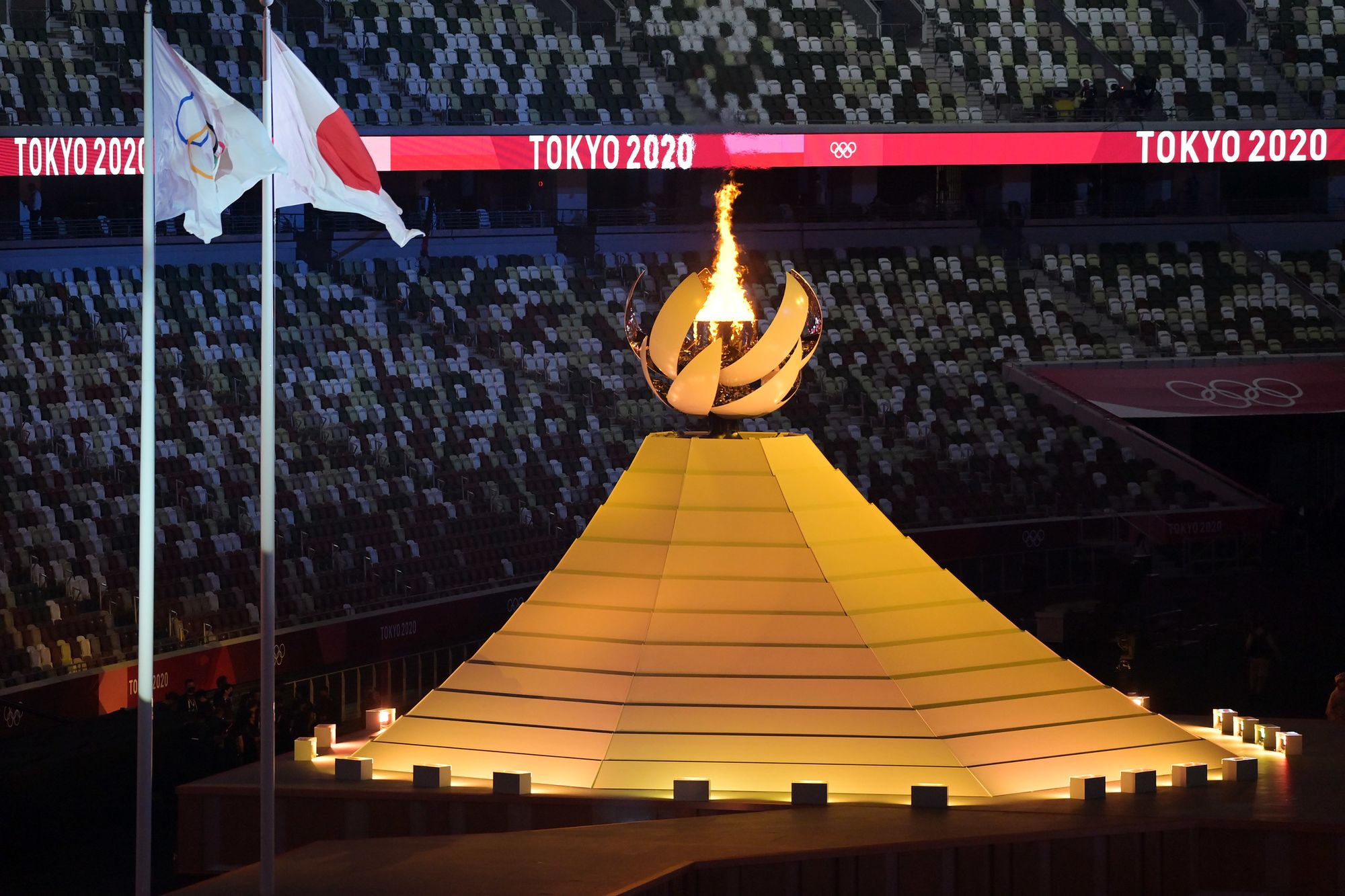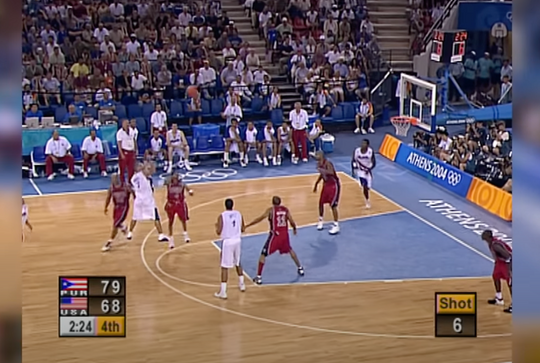After one year of postponement, the Tokyo Olympics went on as planned. Back in June, NHK reported that 10,000 volunteers had quit ahead of the Games. This week, coronavirus cases in Tokyo are surging, with record-breaking daily case counts occurring every day this week. On Saturday, the daily case count was at least 4,058, the most ever reported in a single day in Tokyo, and at least 250 people have tested positive at the Olympics themselves as of August 1, per the Olympics' own data.
At the opening ceremony, everyone sang "Imagine" for some reason, while protests to the Games took place on nearby streets. There was even a "moment of silence" for those lost to the COVID-19 pandemic. Many athletes wear masks except when they are competing (though not always correctly), and there are no fans in the stands. The U.S. Olympic Team, for example, has about an 83% vaccination rate, but vaccines were not required to travel to Tokyo or stay at the Olympic Village, so there are likely hundreds if not thousands of athletes, support staff, and volunteers who are not vaccinated, either by choice or otherwise. Vaccine rollout in Japan has been slower than in many other countries, mostly due to supply issues and additional testing requested by Japanese public health officials.
In short, things could still get very bad in Tokyo before the Olympics are over, and we will probably not know the full impact of the Games until long after the events have concluded. The Olympics last 2 weeks, which is also the well-known incubation period for COVID-19. The biggest case numbers could come well after everyone has packed up and gone home, likely spreading the virus to additional populations as they travel. Scientists have been raising concerns for months that the Tokyo Olympics themselves could create conditions that help the virus evolve into a more spreadable and potent disease. It's a massive event – exactly the sort of thing we are supposed to avoid during a global pandemic – and the show has gone on anyway. By not allowing fans at the Games and frequently testing participants, the Olympics have certainly reduced the risk of spread, but not stopped it altogether, and millions of people are at risk in Tokyo. Many residents in Japan are unvaccinated and will be hard pressed to find a hospital bed should they get seriously ill.
The risk of death has been re-framed as the normal cost of doing business, even more so than usual, over the last year and a half. This isn't going away. While many of us are vaccinated in the United States and can enjoy some activities that we have missed, such as visiting with loved ones and going out to eat, the risk is still unbelievably high for many others. The influx of people to Japan's largest city to hold the Olympics will probably go down in history as a massively, unbelievably stupid decision that put many people at risk for absolutely no reason except to hold a much-anticipated event and make billions in advertising revenue for major television networks that hold the Olympic broadcasting rights.
The immediate future, though, is harder to process. I can only speak for myself, living in the U.S., but I have to feel that we (as in, Americans) bear the brunt of this as a fundamentally broken society. Because we lack meaningful social and governmental support around "what to do" during the pandemic, much of the control we have had over the spread of the virus and our own health has come down to individual responsibility – an American cultural norm that is used to justify everything from mass incarceration to our predatory privatized healthcare system. We basically just wing it, but we do so at our peril. There's no safety net. After a certain point it feels like you're pushed towards nihilism, whether you like it or not, because it's the only buffer you have between yourself and the immense amounts of human suffering that you, as an individual, cannot begin to help solve in any meaningful way.
I was vaccinated in March and while I have continued to practice social distancing and masking in indoor public places, the feeling of being vaccinated, of knowing I was not at high risk of serious illness, changed the way I interacted with the world. I went to a minor league baseball game in June, my first live sports since the PWHPA Philadelphia Showcase in February of 2020. I have tentatively made belated honeymoon plans with my wife for October (though we may have to cancel or make changes, depending on the COVID situation at our intended destination). Increasingly I have distracted myself with daydreams of moving to a remote cabin with an off-grid solar energy system and learning subsistence farming. I just want this to be over. Everyone does. It feels shameful to be aware that you have mentally reached your capacity to process the scale and impact of this ongoing global tragedy. There's no escape from it, no matter what we do. Even if you feel okay going to the bar, or taking a train, or going to work, there are millions of people who don't and can't, and thousands who will be dead from COVID-19 every day for the foreseeable future. Their deaths could have been prevented. With truly strict lockdown measures, equitable vaccine distribution without concern for patents or profits, and true social and material support on a global scale, we could have been done with this a long time ago. But we aren't. It's just going to keep happening.
And that's just COVID stuff – I haven't even touched on the ongoing disaster of climate change. Or the massive resource inequalities and wealth disparities. We've got wildfires, flooding, poverty, and pestilence. It's really not looking good for us as a species or as a planet. And yet they put on the Olympics anyway. They waited a year, saw the infinitesimal gains we made towards stopping the pandemic, and did it anyway. Even before COVID-19, the Olympics had a reputation as a massive event that left destruction in its wake. They damage the environment; they displace and disrupt local residents at host sites; they commit untold amounts of labor violations to construct their venues and facilities; they are rife with corruption, racism, transphobia, homophobia, nationalism, and exploitation.
But people love to watch them. People love sports. It's one of the most anticipated entertainment events every year it rolls around. Since 2008, many Olympic events have been available through online streaming, meaning even obscure events can be watched in high definition. The Olympic Broadcasting Services have standardized production for broadcasts since 2001. This year many have complained that it is hard to find out how to watch events, but a lot of us are still doggedly channel-flipping and pressing buttons on the NBC Sports app trying to get fencing or rugby or badminton or gymnastics or archery on at 11PM or at 4 in the morning.
As John Branch wrote in the New York Times, "As mere entertainment, the Olympics thrive largely on nostalgia and collective memory. Their key conceit is a nationalism fueled by parades, anthems, flag-raising and other ceremonial flourishes that feel detached from global trends. They package harmony without depth, inclusion without context." But those of us who don't buy that – who hate nationalism and capitalism and think NBC's broadcasting conventions are aesthetic and journalistic crimes – still like to watch the Olympics. The joy of sports themselves may not be strictly political, but the act of producing a sports event certainly is. The amount of cognitive dissonance you're willing to endure to enjoy them despite the institutions that surround them varies from person to person.
I would self-identify as an anarcho-socialist, but I still watch the Olympics. I have watched many live events and re-broadcast events from Tokyo this year. Proportionally the National Hockey League has done less harm than the IOC, but I stopped watching it because I couldn't stand the culture, and I don't miss it. I don't think the Olympics should have taken place this year, but they did, and I can't stop watching them – I'm invested now. I love best-on-best competition in sports. I love having something to watch on TV after work with my wife, because I'm still working. I work in IT at a boarding school and electronic supply chain issues are making my summer work more of a shitshow than usual. (We are having students back in the fall – with vaccinations required to return to campus.) I have multiple sclerosis so the heat and humidity have me exhausted. I don't know what else to do, and I don't think me not watching would affect anything, but I still feel guilty. It's like sitting on a secluded mountainside with a drink and an hors d'oeuvre watching the valley below go up in flames.
I asked a group of my friends, who are also leftists, whether they were watching the Olympics or not. We actually have a group chat that was founded back in 2018 around watching the Olympics and the World Cup. My friend Jackie said, "Honestly, I haven't watched a lot of sports at all over the pandemic in general, so it's not a specifically Olympics thing. But it all feels unreal? Fake? And just not worth the incredible risk to athletes and stadium employees." Another friend concurred: "I also haven't watched any Olympics this year. It's because I don't want to rubberneck the car crash."
Of course, it isn't that the Olympics was once a great event an institution and now suddenly isn't because of the pandemic. It's always been a car crash, just the scale and impact of the car crash just keeps getting bigger, like one of those viral traffic camera videos of a soundless 20-car pileup. Just when you think it can't get any worse, an oil truck barrels around the corner and crashes into the whole pile. You'd only hear the screams and crashes if you were there. But you aren't; you're at a distance, and the effect is muted. It's hard to comprehend mass death – it just is. Our brains can't easily comprehend that level of scale – we probably evolved this way as a form of self-preservation. Empathy in situations like this can require intention and practice.
I asked the general public on Twitter how they were feeling about watching the Olympics, too, and I got a wide variety of responses. "The Olympics... are meant to highlight the best of humanity, and if the committees in charge of that cannot embrace those ideals, I want nothing to do with the events," said one Twitter user who responded to my prompt. "I am aware the Olympics have always had trouble living up to the lofty ideals they set for themselves. This year may not be any worse than previous years. We have just been made more aware of these bad decisions, thanks to better [coverage of] said decisions in media. There's also the question of whether the games should even be happening given the ongoing pandemic, but gotta make that money, right?"
"Normally I watch nothing but the Olympics, but this year I'm only watching a few events," shared a Twitter user named Cristine. "The emotional connection isn't there because of all we lost over the last year and a half. What the athletes have done to get to the Olympics is amazing and should be recognized. But, not at the expense of the health and lives of folks living near Olympic event sites, the workers and numerous others who may come into contact with covid unnecessarily."
Others expressed that they probably would have watched the Olympics if they hadn't found the Peacock app so confusing, if they hadn't needed a cable subscription to sign in to watch something, if they'd had more time. The Olympics bill themselves as this unifying event, but they've been more discordant than ever in 2021. A lot of people are angry, and a vast amount of others just can't be bothered.
That said, watching or not watching the Games is a personal choice, and not a systemic initiative. Enough people like the Games, and they still draw in so much money that even if they weren't immensely popular, the money would still be there for someone to burn. Money and power make a lot of things happen that aren't strictly popular (think overseas colonialist wars or CIA-backed coups, for example). The Olympics are a massive propaganda tool and there will always be people out there who are willing to overlook the harm they do – or are even happy to be complicit in it. And there will always be people out there who have a vested interest in obfuscating that harm, because the Olympics exist to serve the wealthy, the capitalists, and to serve the project of nationalism. (For more on that, check out this great interview with Shireen Ahmed and Jules Boykoff on the Citations Needed podcast, which does a great job of highlighting these issues.) They do not exist to serve the athletes or the host cities or even the people who tune in to watch them on their nation's TV networks. Every VISA ad you watch during the Olympics creates a small amount of passive income that is just coincidental to the larger machinations at play.
So ultimately it's not about whether you watch or don't watch the Olympics; it's about something else. No one I spoke to for this story thought the Olympics were a good institution to uphold in its current form, even those of us who chose to watch. One person I spoke to, a lawyer at a nonprofit, explained that even though she is enjoying watching the Games and thinks they still carry a positive message, she doesn't think they should have taken place. "Our U.S. Olympic team is so diverse and dynamic and they represent us so well on the national stage. They represent who I wish we were ALL the time," she said. "In the Olympics, we are lead by WOC, queer people, and otherwise marginalized and ignored people. They become our lodestars and it's beautiful... But I don’t think [the Olympics] should have happened. Japan is being ravaged by COVID and as the Delta variant gains power, the Olympics carrying on as normal is (I think) lulling people into a false sense of security that the pandemic is over."
My own experience with watching the Olympics feels fraught, to say the least. I've quit watching sports before. I get really heated on Twitter about not watching the NHL anymore. I had gotten so close to it, and it was such a big part of my life, that quitting the NHL felt more like a messy and life-changing breakup from a bad relationship rather than a simple choice about what to do with my free time. At that point I felt like I stopped being a sports fan – I stopped enjoying sports as a whole (not just the NHL, but all of them) because the institutions around them felt insurmountably evil. Many people I spoke with are going through this now thanks to the pandemic and the Olympics. It makes sense to me. I've been there.
One person I spoke to, an HVAC technician in the Philadelphia area named Vishu, contrasted his choice to not watch the Olympics with the fact that he continues to watch the NFL. Vishu thought he would quit watching the league several years ago due to how the NFL handled Black Lives Matter protests and blackballed Colin Kaepernick. "In spite of myself, between fantasy and the excitement of the sport itself, I found myself watching," he said. "I'm still conflicted with the recent race-norming stuff for brain injury settlements, denying CTE to begin with, and taking four years to admit Kap was right but him still somehow not having a job... I think part of [it], at its core, is definitely that I just enjoy watching football more than the Olympics. I understand it more."
Vishu's response reminded me that it's the love of the experience, not a love of the institution, that drives us towards sports in many cases. It's the goal of a league like the NFL or NHL to persuade the consumer to conflate the two, to engender intense parasocial relationships and reinforce social norms. The IOC takes that project to another level, portraying the Olympics themselves as something essential to our global society. It's a neat trick if you can pull it off: selling the concepts of togetherness and unity in the same package as nationalism, binary gender policing, racism, imperialism, and whitewashing of state-sanctioned violence.
Though for my part, watching the Olympics has been a window into a world where maybe I can enjoy sports again. The production and the commentary around it may be totally artificial, but it's the quiet moments that get me. I love watching raw feeds from the Olympic Broadcasting Service without NBC's commentary because I can tune out the relatively soft-spoken announcers and just watch the athletes. (Or in the case of the women's rugby tournament, actually benefit from strong and informed commentary on women's sports that highlights the accomplishments of the athletes in a respectful way – a huge difference from the dramatic fussiness of NBC's house commentating style, which remains a turn-off for me.)
A Twitter user I spoke to named Ashna, who is also watching the Olympics, told me: "I love sports in general, and the Olympics are the easiest way to watch so many elite athletes compete at the highest level without having to follow each sport individually. To know that these athletes train for so many years for a few moments and then to get to watch that happen is so much fun." That's the purest description of the Olympics I can think of, and why I think many people are still finding joy in them despite everything else. "The hardest part is that so many folks who live in Japan seemed to be really worried about the effect on the community and I'd feel exactly the same if they were happening in my home," Ashna added. "I thought that the IOC would be stricter than they have been for athletes getting vaccinated and such but I guess I should've known better than to get my hopes up."
To feel comfortable tearing something down, we have to well and truly divest from it. But if we aren't ready to divest from the Olympics, because they still contain some modicum of joy, then the process of tearing it down will be painful, but it seems like it has to be done if we intend to create something better in its place that doesn't leave pain and suffering in its wake like the world's most expensive and bigoted tornado.
Another conversation I had was with a communications professional who has worked in the Olympic movement. They aren't watching the Games, either. "I think it’s a sense of disillusionment with the movement as a whole. I have worked building up to these Games since PyeongChang, but everything the space has been through in these last few years – from reckoning on athlete safety to all the backlash on athlete protests to the pandemic, there’s this question of is there still magic in the Olympics? And for me, I'm not sure right now."
"There's magic in the performances and these athletes reaching their dreams; it's the space around them, the way the world treats them as superheroes rather than amazing, imperfect humans, the way sports organizations have proven their concern for money over people that have pushed me away from the TV for a break," they continued. "It's a pandemic; there's so much more progress we need to make health-wise, freedom of speech-wise, safety-wise. I love the athletes and their stories, but just couldn't ignore the issues enough to fall into the joy of the spectacle this month."
Ending the Olympics forever, or ushering forward their obsolescence, is an intriguing prospect and the movement to do so predates the pandemic, often from people who are passionate about sports and want them to be better. This investigative piece by Alex Perry in Outside takes a long, hard look a the corruption behind international swimming and its governing body, FINA. But the alternative that it presents is not necessarily revolutionary, unless you think that it's a big workers' rights victory to have a league owned and operated by an ultra-wealthy businessperson who has decided that sport is their new pet project – this happens every day in every country that has millionaires and billionaires and doesn't necessarily do much to protect athletes' rights as workers. Not to mention other league and team employees or the communities that each team calls home.
Worker- and community-owned teams and leagues seem like the logical proposition if you're having a theoretical discussion about how to improve conditions for athletes and advance ethics in sports. The mountains that are moved to make the Olympics happen every two years would likely have to become smaller and more focused for whatever comes next. We can still have international and global sporting competition without creating such massive resource and money sucks – there has to be a way. But the success of that model would rely on acceptance of the fact that these impossibly big, singular events are impractical and exploitative. Unfortunately, the things that makes them so special and magical are the same things that make them unworkable and perhaps even dangerous in our new reality.
That, combined with the overwhelming negative impact of the Games themselves, should be enough to make us cognizant of the fact that we have to move on from them. We have to envision something better. The harm is why they have to end, and the magic and beauty are what can inspire us to create something better.
So whether you're watching the Games or not, it might be for the same reason: to envision a better future. And to have that future, we need to be willing to let go.
(Photo: France Olympique/Flickr)







